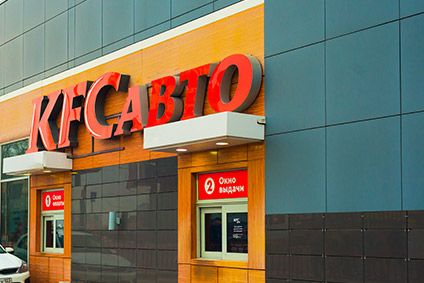
Global fast-food giant KFC is working with 3D printing to develop an alternative to chicken nuggets made without meat.
The US-based foodservice operator said it has joined forces with Russian firm 3D Bioprinting Solutions, which is developing additive bioprinting technology that uses a recipe of chicken cells and plant ingredients.

Discover B2B Marketing That Performs
Combine business intelligence and editorial excellence to reach engaged professionals across 36 leading media platforms.
In a statement to announce the tie-up, KFC said the “growing popularity of a healthy lifestyle and nutrition”, the increase in demand for alternatives to meat and “the need to develop more environmentally-friendly methods of food production” were why it is looking to develop what it called “the meat of the future”.
KFC, which will provide ingredients such as breading and spices, said there are “no other methods available on the market that could allow the creation of such complex products from animal cells”.
It added: “The project aims to create the world’s first laboratory-produced chicken nuggets.”
Just, the US firm best known for its plant-based alternatives to egg, unveiled its own chicken nugget developed in a lab almost two years ago.

US Tariffs are shifting - will you react or anticipate?
Don’t let policy changes catch you off guard. Stay proactive with real-time data and expert analysis.
By GlobalData3D Bioprinting Solutions said it was testing a number of sources for the plant-based ingredients to be used in KFC’s nuggets. Andrei Rukavishnikov, the company’s sales and marketing director, said the cost of production was a reason why plant ingredients are being used to create a “hybrid” product.
“We are going to test various plant-protein sources including different beans and see which of them delivers best results with our printing technology. At the moment, the cost of cells is very high and may reach up to several thousands pounds per kilo depending on the cell line. That is why at this stage we use a plant-animal hybrid in our production,” Rukavishnikov said.
In time, Rukavishnikov suggested, when the price of cells declines to a certain level, the nuggets would be able to be developed without plant ingredients.
“The industry saw the drop in cells’ price by more than 100 times over the last seven years and undoubtedly this process will continue. We expect within several years hybrid products will hit the shelves followed by pure crafted meat once its cost is equal to the price of traditional meat.”
KFC said “receiving a final product for testing” is planned for this autumn in Moscow. Asked to clarify if that meant the nuggets would be on sale for consumers in the Russian capital, the company told just-food: “The testing of the first prototype this fall is intended exclusively for partners, market experts, and media. Based on the first test results, we will decide on further steps.”
The quick-service restaurant operator has used Moscow to test its “restaurant of the future” concept, recently showcasing an automated outlet in the city where interactions between customers and staff are minimised.
KFC said the development of nuggets made with animal cells and plants was part of that concept, which it cited when asked what research the company had undertaken to make it think consumers are ready for such a product.
“KFC strives to meet modern challenges by carefully studying the latest technological and innovative developments and testing them in its restaurants to create new experiences for our guests and to drive the foodservice industry forward. The launch of the food printing project became a logical step in the development of our concept of the ‘restaurant of the future’,” it said.





